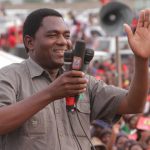Malawi bankrupt of leadership
Published on November 5, 2012 at 8:06 AM by FACE OF MALAWI
Of late, interesting voices have been telling us much of what is wrong about our country’s leadership.
The vibes make excellent reading. Henry Kachaje, Chief Executive Officer of Business Consult Africa, burst into the national limelight with a spirited presenta¬tion he made in Blantyre recently, entitled ‘Imagine an economically independent Malawi.’
Matthews Chikaonda, for¬mer Finance Minister, ex-Reserve Bank Governor and current CEO of Press Corporation made Kachaje-like arguments a few days ago when making a presen¬tation before the Public Affairs Committee.
‘We are where we are today because of lack of a clear national shared vision,’ said Kachaje. ‘I do not know if our leaders have any clue as to where they would like to see our country in 2050. If they do, then I as a citizen am not well informed.
“One may be led to believe that the country is moving in any direction suggested and proposed by anyone with a fat purse who makes any shallow promises of some free handouts. We are con¬trolled by short-term thinking and short-term planning. We have be¬come a “Pompo-pompo” nation. The longest “active” plans we have as a nation only project five years into the future, and this is very sad.”
Kachaje continues: ‘We once had vision 2020, it gave hope to discerning Malawians. Sadly, when leadership changed hands, no one seemed to refer to it any more as the core basis for making our economic direction. In case some of you have no clue what vi¬sion 2020 stated, here it is:
“By the year 2020, Malawi as a God-fearing nation will be secure, democratically mature, environ¬mentally sustainable, self reliant with equal opportunities for and active participation by all, having social services, vibrant cultural and religious values and being a technologically driven middle-income economy.”‘
While Chikaonda’s message was not as extensive and as deep as Kachaje’s, he, too, railed against the lack of leadership in our coun¬try, observing that there is lack of vision, commitment and political will on the part of the governing elite.
Said Chikaonda: “It is impos¬sible to see an elephant in its en¬tirety from one position. You need to go round it to see the whole el¬ephant. Our elected leaders need to see beyond what is just in front of them. They need to see the big picture, the whole picture.”
The key message is one, and this is that Malawi is becoming bankrupt of leadership. Our lead¬ers concentrate mostly on accu¬mulating personal wealth. They want to become big and not to make Malawi become big.
Our political parties do not have a single philosophy to stand for. Let us look at Democrats and Republicans in the United States. Republicans believe in individual achievement for the benefit of all. Democrats believe in collective achievement for the benefit of the individual.
What is the vision of the Peo¬ple’s Party? What is the vision of the Malawi Congress Party? What is the vision of the Democratic Progressive Party? What is the vision of the United Democratic Front? How different is each vi¬sion from the other?
Answer number one: none of the parties have any vision for the country to begin with, and I will not even get down to as low as Mark Katsonga’s or Kamuzu Chi¬bambo’s briefcase parties. They have no philosophy and prob¬ably have never heard of the word ‘philosophy’.
They will all build bridges (which they never actually do when elected, not even bridges across ethnic groups). They will ensure food security. They will buy you shoes. They will, in short, tell you anything good you want to hear, and will not admit to any limitations at all, despite the obvious fact that the said political parties are made of human beings as fallible as any.
Answer number two: because they have no vision, they are not different from each other. They are all a collection of individuals who do not know what exactly to do when in power, except to marvel in the vainglory of riding Mercedes Benz and being called honourables.
This is why, within hours af¬ter a party is ejected from power due to the death of its president, politicians change parties like clothes, and move on as though nothing happened. This is why when new parties are formed, the leaders elected to powerful posts are the likes of Sidik Mia ex-UDF, ex-DPP turncoat.
Gullibly, we, the people, ap¬plaud such nonsense and regard it as change. Madness, as they say in Japan is when the person does the same thing over and over again and expect a different result. We put in power the same people whose ideas have failed in the past and expect a different re¬sult. We even have the audacity to call it change.
While PP correctly argued that it needed a blend of experience and novelty to claim the mantle of change, they instead went on overdrive recruiting all the rejects of the past at the expense of new voices, and now there is no way to tell how different this party is from any.
So, here we are, stuck with a pile of leaders who do not have a single new idea of moving the country forward. As Kachaje says, they are pompo-pompo leaders. We do not have a single document that envisions where Malawi should be by 2064, when Malawi shall be 100 years.
No doubt they will all tell you their vision of 2014, that they want to win. But that is all. What they shall do with that victory is not known.
The leaders will build houses for themselves and accumulate sudden inexplicable millions of Malawi Kwacha in their bank accounts and be considered as big men. What about the people? Used like a condom to get to the pinnacle of power, and, thereafter, ignored, dumped and forgotten.
What, then? Is it enough for Chikaonda, Kachaje and others to point out the wrongs? Not at all. They should learn from Plato, who said: ‘One of the penalties for refusing to participate in poli¬tics is that you end up being gov¬erned by your inferiors.’ There are bright spots, as not all our leaders are bad. But the majority are chaff.


